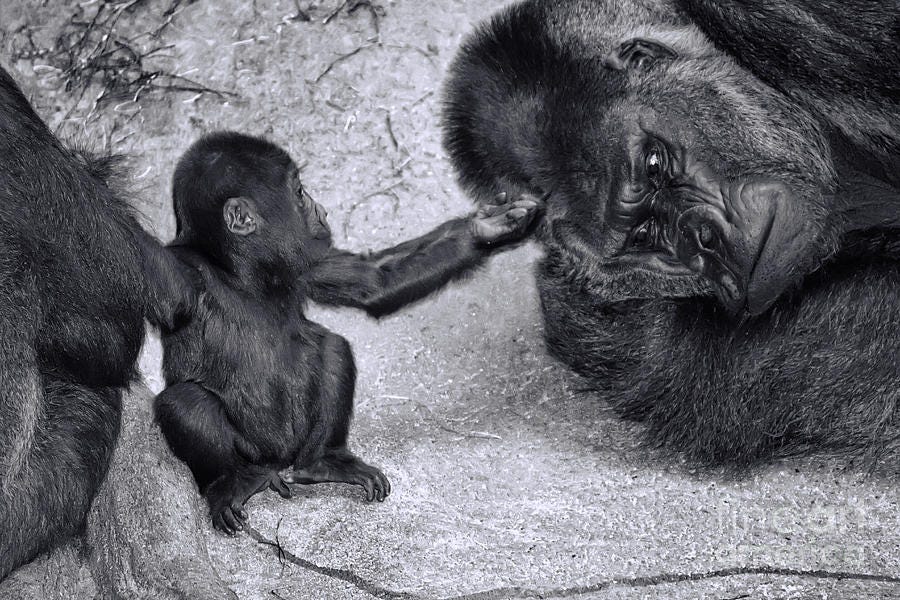Mosh Pit
Let’s workshop this poem that explores the tension between the deep instinct to maul and the deep instinct to protect, a social-antisocial tension embodied in the controlled violence of a mosh pit
scent of the day: Honour Man, by Amouage
Mosh Pit
Even gorilla parents
wrap their lips over their teeth
while nibbling at toddler limbs—
perhaps, pestered by all
the ear-pulling romping of dumb
flesh pathetic in its fragility,
this being, as with us,
a negotiated placation of that urge
(flirty) to bite clean through.







This poem offers a visceral exploration of primal impulses, drawing a parallel between human and animal behavior through the metaphor of a mosh pit. The opening line, "Even gorilla parents wrap their lips over their teeth," sets the stage for a meditation on restraint and the balance between aggression and affection, especially in parental relationships. Gorillas, known for their strength and potential ferocity, are portrayed here as embodying a careful, controlled interaction with their offspring, much like human parents who must temper their power when engaging with vulnerable children.
The physicality of the imagery, particularly the "nibbling at toddler limbs," highlights the tension between the primal urge to exert force and the necessity of tenderness. This tension mirrors human experiences where instincts to dominate or overpower must be subdued in the face of fragility and innocence. The mosh pit, implied through the metaphor of "ear-pulling romping of dumb flesh," serves as a symbol for both play and the underlying potential for violence in social interactions. Here, the "dumb flesh" speaks to the inherent vulnerability of the young or weaker party, whose playful or chaotic movements test the limits of the stronger being's self-control.
The poem’s deeper theme revolves around the idea of placation—specifically, how beings, whether animal or human, manage their aggressive urges through negotiated behaviors. The urge to bite "clean through" becomes a metaphor for unchecked aggression or violence, while the act of nibbling and lip-wrapping represents the channeling of those impulses into socially acceptable actions. This primal flirtation with violence is not eradicated but managed through a delicate dance between desire and restraint. The speaker suggests that such behaviors are not limited to animals but are intrinsic to human nature as well, making the mosh pit a fitting metaphor for the chaotic, often unspoken negotiation between our violent urges and the social need for control.
The poem thus becomes an exploration of the thin line separating play from harm, highlighting how both humans and animals navigate this boundary. It raises questions about the nature of power, vulnerability, and the inherent fragility of life, all of which are subjects negotiated through our interactions with others—be it in a parental relationship, a social gathering, or the wider context of societal norms that manage violence.
primal urges, gorilla parenting, mosh pit, violence, restraint, fragility, social negotiation, human behavior, parental interaction, animal metaphor.